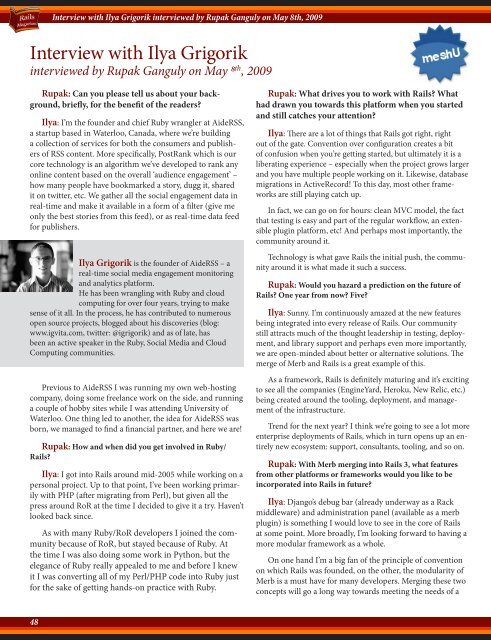Rails Magazine - Issue 3
Rails Magazine - Issue 3
Rails Magazine - Issue 3
You also want an ePaper? Increase the reach of your titles
YUMPU automatically turns print PDFs into web optimized ePapers that Google loves.
48<br />
Interview with Ilya Grigorik interviewed by Rupak Ganguly on May 8th, 2009<br />
48<br />
Interview with Ilya Grigorik<br />
interviewed by Rupak Ganguly on May 8 th , 2009<br />
Rupak: Can you please tell us about your background,<br />
briefly, for the benefit of the readers?<br />
Ilya: I’m the founder and chief Ruby wrangler at AideRSS,<br />
a startup based in Waterloo, Canada, where we’re building<br />
a collection of services for both the consumers and publishers<br />
of RSS content. More specifically, PostRank which is our<br />
core technology is an algorithm we’ve developed to rank any<br />
online content based on the overall ‘audience engagement’ –<br />
how many people have bookmarked a story, dugg it, shared<br />
it on twitter, etc. We gather all the social engagement data in<br />
real-time and make it available in a form of a filter (give me<br />
only the best stories from this feed), or as real-time data feed<br />
for publishers.<br />
Ilya Grigorik is the founder of AideRSS – a<br />
real-time social media engagement monitoring<br />
and analytics platform.<br />
He has been wrangling with Ruby and cloud<br />
computing for over four years, trying to make<br />
sense of it all. In the process, he has contributed to numerous<br />
open source projects, blogged about his discoveries (blog:<br />
www.igvita.com, twitter: @igrigorik) and as of late, has<br />
been an active speaker in the Ruby, Social Media and Cloud<br />
Computing communities.<br />
Previous to AideRSS I was running my own web-hosting<br />
company, doing some freelance work on the side, and running<br />
a couple of hobby sites while I was attending University of<br />
Waterloo. One thing led to another, the idea for AideRSS was<br />
born, we managed to find a financial partner, and here we are!<br />
Rupak: How and when did you get involved in Ruby/<br />
<strong>Rails</strong>?<br />
Ilya: I got into <strong>Rails</strong> around mid-2005 while working on a<br />
personal project. Up to that point, I’ve been working primarily<br />
with PHP (after migrating from Perl), but given all the<br />
press around RoR at the time I decided to give it a try. Haven’t<br />
looked back since.<br />
As with many Ruby/RoR developers I joined the community<br />
because of RoR, but stayed because of Ruby. At<br />
the time I was also doing some work in Python, but the<br />
elegance of Ruby really appealed to me and before I knew<br />
it I was converting all of my Perl/PHP code into Ruby just<br />
for the sake of getting hands-on practice with Ruby.<br />
Rupak: What drives you to work with <strong>Rails</strong>? What<br />
had drawn you towards this platform when you started<br />
and still catches your attention?<br />
Ilya: There are a lot of things that <strong>Rails</strong> got right, right<br />
out of the gate. Convention over configuration creates a bit<br />
of confusion when you’re getting started, but ultimately it is a<br />
liberating experience – especially when the project grows larger<br />
and you have multiple people working on it. Likewise, database<br />
migrations in ActiveRecord! To this day, most other frameworks<br />
are still playing catch up.<br />
In fact, we can go on for hours: clean MVC model, the fact<br />
that testing is easy and part of the regular workflow, an extensible<br />
plugin platform, etc! And perhaps most importantly, the<br />
community around it.<br />
Technology is what gave <strong>Rails</strong> the initial push, the community<br />
around it is what made it such a success.<br />
Rupak: Would you hazard a prediction on the future of<br />
<strong>Rails</strong>? One year from now? Five?<br />
Ilya: Sunny. I’m continuously amazed at the new features<br />
being integrated into every release of <strong>Rails</strong>. Our community<br />
still attracts much of the thought leadership in testing, deployment,<br />
and library support and perhaps even more importantly,<br />
we are open-minded about better or alternative solutions. The<br />
merge of Merb and <strong>Rails</strong> is a great example of this.<br />
As a framework, <strong>Rails</strong> is definitely maturing and it’s exciting<br />
to see all the companies (EngineYard, Heroku, New Relic, etc.)<br />
being created around the tooling, deployment, and management<br />
of the infrastructure.<br />
Trend for the next year? I think we’re going to see a lot more<br />
enterprise deployments of <strong>Rails</strong>, which in turn opens up an entirely<br />
new ecosystem: support, consultants, tooling, and so on.<br />
Rupak: With Merb merging into <strong>Rails</strong> 3, what features<br />
from other platforms or frameworks would you like to be<br />
incorporated into <strong>Rails</strong> in future?<br />
Ilya: Django’s debug bar (already underway as a Rack<br />
middleware) and administration panel (available as a merb<br />
plugin) is something I would love to see in the core of <strong>Rails</strong><br />
at some point. More broadly, I’m looking forward to having a<br />
more modular framework as a whole.<br />
On one hand I’m a big fan of the principle of convention<br />
on which <strong>Rails</strong> was founded, on the other, the modularity of<br />
Merb is a must have for many developers. Merging these two<br />
concepts will go a long way towards meeting the needs of a


